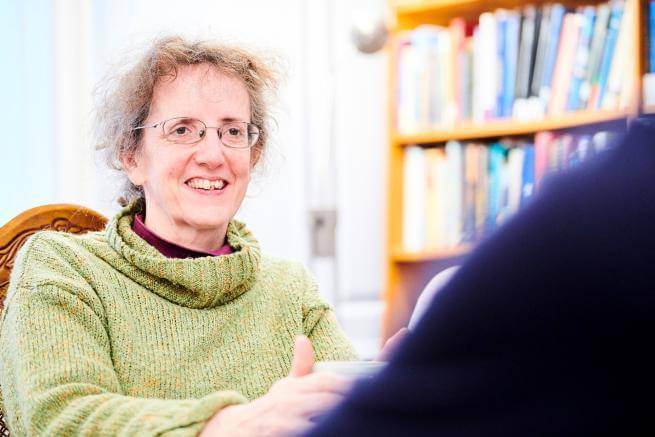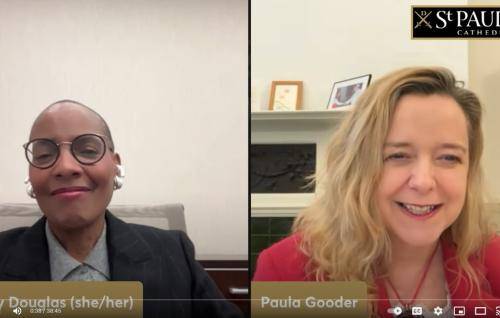Light and darkness
Light and darkness
Karen Kilby reflects on faith in times of light and darkness.
1. Love and suffering
Is the glass half full or half empty? Are you an optimist or a pessimist? These are familiar questions, useful in their way. They offer a first step in reflecting on how we relate to the light and the darkness in our lives - but it is worth seeing if we can go a bit further.
There are elements of light and dark in all our experience - some joy and some sorrow, some love and some suffering, some goodness and some encounter with evil. How do we imagine the relationship between these things, between the light and the dark we experience? I’d like to reflect on this over the next month because I am convinced it is one of those areas where a small difference can make a really big difference. It’s like what happens if I steer a boat over a long distance in a slightly altered direction, or put something in my diary a day after where it should be, or routinely spend just a little more than I earn rather than a little less. Small shifts in the way we think, too, can have large consequences.
One very basic commitment at the heart of the Christian faith is that we cannot view light and darkness symmetrically, as opposing but somehow balanced forces. Of course we cannot pretend not to see the dark-- it is wrong to deny or minimize the suffering and loss, the futility and harm, that afflict ourselves and our fragile world. And yet the whole pattern of Christian faith requires us to believe love and goodness are ultimate, however little we may see or feel this at any particular time. This is what it is to believe in a God who is not one of a pair of equal and opposite forces but the sole creator of heaven and earth, and to believe in the resurrection and the life of the world to come.
2. In Service to the Light
If darkness and light are not equal and opposite presences, how should we think of them? One option is to suppose the darkness always has a positive role, that ultimately it is always in service to the light. Does this mean we ought to be reconciled to the dark in our lives and in our world? Is this what belief in God requires of a person?
When people assume that this is a requirement of faith, they lay a burden on themselves to find the good in everything. And of course often there is good to be found in that which is hard, dark and painful. The ancient Greeks had a pithy phrase, “pathei mathos”, meaning you learn through suffering. Modern culture has its equivalents (“no pain, no gain”). Often people give testimony to grace in the midst of suffering or loss, to the presence of God in moments of weakness and need, to moments of sanctity and deepened love even around a deathbed.
Turn these experiences into a general rule, though, and you end up with something both burdensome and disturbing. If I experience a long and debilitating illness, must I add to everything else I suffer the sense that I am a spiritual failure not to find a deep mystery in it? If I hear of terrible atrocities, near or far, must I seek to find some happy consequence of them?
In Scripture Job rages against all he has suffered and lost, and berates God. His friends, his so-called “comforters”, are shocked. They try to persuade him to see that it all fits into their broader vision of a just and harmonious world. But in the climactic and confusing conclusion to the Book of Job, one thing at least is clear: Job’s comforters have it wrong. Unlike Job, says the Lord, they have “not spoken of me what is right”.
3. Finding light in darkness
If we are to avoid following in the footsteps of Job’s false comforters, must we turn our back on finding hope, meaning or new life in the midst of the darkness of suffering and loss? Can that really be right?
Anyone who has studied a foreign language has probably learned to distinguish first from second and third persons: I from you from he/she/they. These grammatical distinctions can help clarify when we should—and when we shouldn’t— search for light in darkness or meaning in suffering.
In a first-person encounter with suffering and loss, I am reflecting on my own life and experience. Sometimes I can speak of paradoxically discovering good in what is not good. Perhaps some important new understanding has become possible, or I find a new pathway in my life has opened up, or I have had an extraordinary sense of God’s love in the midst of pain. But when I hear about your pain or suffering or loss, it does not work so well for me to search for light in it.
Imagine an encounter with someone with chronic pain and a disability leading to the loss of work they love. Suppose my response is “I am sure you will find there are gifts in it”. This would be just wrong. It would be wrong even if the thing said turned out to be true. Still more in a third-person relationship to suffering— when we grieve to learn what is happening to people far away, when, as this week, we offer our prayers with a sense of helplessness: then especially we have no business speculating about a good that might come out of it all.
When the suffering is not our own, sometimes we can be with a person, listen and offer our presence; sometimes we can act; always we can pray. But we are not the ones who can find light in the darkness of another.
4. The light shines in the darkness
“Is the world getting bleaker, or am I just reaching middle-age?” I asked my mother. “Which would be worse?” was her only reply.
I am now, a couple of decades later, fully convinced we live in a darkening time, politically and ecologically. The Pope himself writes that “the world in which we live is collapsing and may be nearing the breaking point.” So I wonder: what does hope mean? What can it look like in such a context?
The light shines in the darkness, and the darkness did not overcome it. It’s a familiar verse from John’s Gospel, but interesting to notice what it doesn’t say-- “the light shines so the darkness is no more” or “the light shines and the darkness steadily recedes ”. John’s Prologue evokes something like a candle flickering in the night rather than a room illuminated at the press of a switch.
It would be comforting to look at global politics, and our escalating destruction of nature, and have an analysis of how this dark time will lead to some good thing. Who knows? Maybe it will. But in any case Christian hope is both more modest than that, and more radical.
When the darkness is also our darkness— perhaps because we turn towards the ecological crisis rather than away, taking action rather than choosing distraction— then there is a faith that Christ is with us, and hope that we may indeed encounter him in moments of grace, the flickering candle in the midst of the deepest night. Grace can come in the smallest of things and the lightest of touches.
But Christian hope is also a soaring and unthinkable hope, the hope in a God who creates out of nothing, whose Spirit moves in unexpected ways, who raised Jesus from the dead. It is a hope reaching through and beyond all we understand. And so it is a hope which enables us, when this is our calling, to face the darkness rather than flee it.








